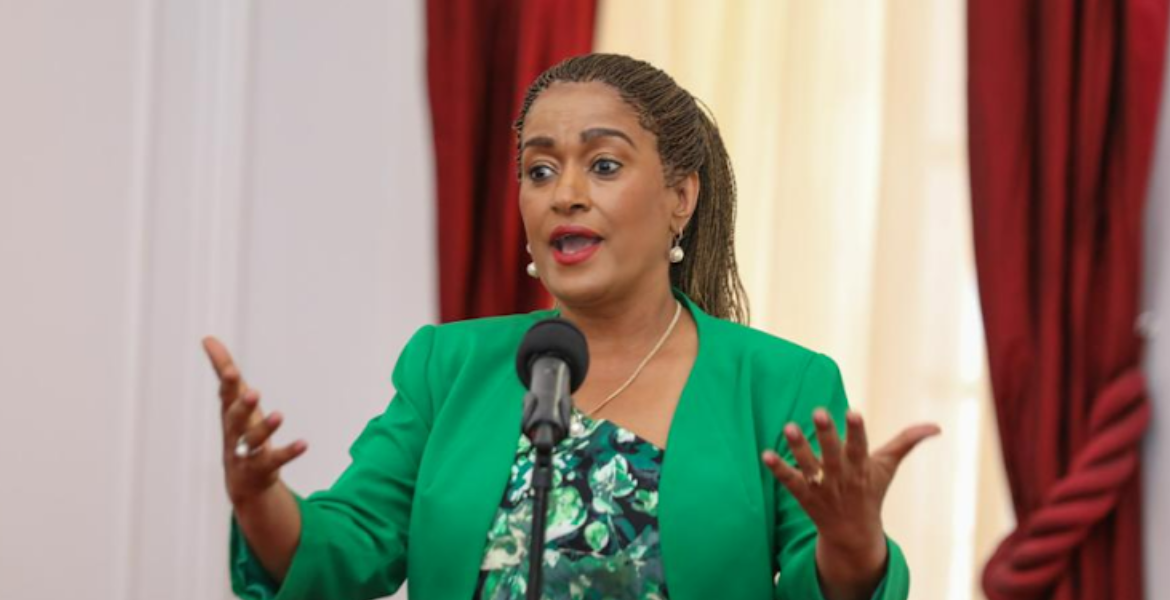News
Activists File IEBC Petition to Recall Nairobi Woman Rep Passaris
Should the IEBC validate the petition, the activists face the daunting task of collecting at least 750,000 valid signatures representing 30 percent of Nairobi’s 2.5 million registered voters.

Four determined activists have officially launched what could become Kenya’s first successful parliamentary recall, filing a petition with the Independent Electoral and Boundaries Commission (IEBC) to remove Nairobi Woman Representative Esther Passaris from office.
The petition was submitted by activist Shakira Wafula on Monday July 28, and the commission acknowledged its receipt on the same day.
Leading the charge alongside Wafula are Mavin Mabonga, Dominic Omondi, and Sichei Soet, who walked into the IEBC offices armed with allegations of constitutional violations and abandonment of representative duties.
Charges Against Passaris
The petitioners have leveled serious accusations against the two-term legislator, centering their case on her support for controversial legislation requiring demonstrators to obtain prior approval from authorities.
They argue this stance fundamentally violates the constitutional right to protest and aligns her with what they describe as “executive overreach.”
The activists also highlight Passaris’s alleged silence during recent protests that were violently dispersed by police, resulting in injuries and allegations of sexual violence.
“At a time when Nairobi women were on the receiving end of police brutality, Ms Passaris whose office is specifically designed to amplify women’s voices remained conspicuously absent,” the petition states.
Financial transparency forms another pillar of their case.
The petitioners accuse Passaris of failing to provide accountability for funds from the National Government Affirmative Action Fund (NGAAF), which is intended to support vulnerable groups including women and youth.
They claim she has resisted calls to publish audited reports or provide basic information on fund allocation and spending.
Constitutional Framework
No MP in Kenya has ever been successfully recalled under Article 104, making the current wave of petitions historic in its ambition but also reflective of a system that has proven resistant to citizen-led accountability.
The recall process, while constitutionally guaranteed, presents formidable challenges.
Should the IEBC validate the petition, the activists face the daunting task of collecting at least 750,000 valid signatures representing 30 percent of Nairobi’s 2.5 million registered voters.
These signatures must also reflect support from at least 15 percent of voters in at least half of Nairobi’s wards.
Chances of Success
The prospects for success appear challenging yet not entirely impossible. Wafula expressed confidence about reaching the signature threshold, stating: “I’m actually very confident that when we start collecting signatures, it will be possible to get more than one million. Despite filing the petition under my name, I represent many voices — people in social justice networks, online communities, and our neighbourhoods.”
However, the logistical hurdles are substantial.
Petitioners must collect signatures from at least one-third of registered voters in the affected constituency, evenly spread across multiple wards a logistical nightmare in a sprawling metropolis like Nairobi.
The geographic requirement alone presents significant challenges in a county with 85 wards, where activists must ensure representation from at least 43 wards while maintaining the overall 30 percent threshold.
This demands not just popular support but also sophisticated organizational capacity and substantial financial resources.
Sources within the Independent Electoral and Boundaries Commission (IEBC) confirmed that as of Thursday, close to 60 recall petitions had been received from citizens accusing their MPs of failing to represent their interests.
This surge in recall attempts follows recent anti-government protests and suggests growing citizen frustration with parliamentary representation.
The timing of the Passaris petition is strategically significant.
Filed within the constitutionally allowed window after two years in office and not within the last year of her term, it represents one of the most organized recall attempts to date.
If the IEBC validates the petition, the activists have 30 days to collect the required signatures.
The Commission then has 30 days to verify the signatures, and if successful, must notify the Speaker of the National Assembly, who is required to call a recall election within 90 days.
For the recall to succeed, at least 50 percent of all registered voters must participate in the election, with the majority voting in favor of removal.
This final hurdle requiring 1.25 million Nairobi voters to participate, may prove the most challenging aspect of the entire process.
Beyond Passaris
The petition has broader implications beyond Passaris herself.
It represents a test of Kenya’s democratic institutions and citizen power, occurring amid growing calls for greater parliamentary accountability.
Success could embolden similar efforts across the country, while failure might reinforce perceptions that the recall mechanism is more theoretical than practical.
Passaris has not responded to requests for comment regarding the petition, leaving her defense strategy unclear as the legal process unfolds.
The activists describe their initiative as both symbolic and civic-minded, aimed at rekindling public agency and holding elected leaders accountable.
Whether they can overcome the substantial practical hurdles to achieve this ambitious goal remains to be seen, but their effort has already made history as one of the most serious recall attempts in Kenya’s democratic era.
Kenya Insights allows guest blogging, if you want to be published on Kenya’s most authoritative and accurate blog, have an expose, news TIPS, story angles, human interest stories, drop us an email on [email protected] or via Telegram
-

 Grapevine5 days ago
Grapevine5 days agoAlleged Male Lover Claims His Life Is in Danger, Leaks Screenshots and Private Videos Linking SportPesa CEO Ronald Karauri
-

 Lifestyle1 week ago
Lifestyle1 week agoThe General’s Fall: From Barracks To Bankruptcy As Illness Ravages Karangi’s Memory And Empire
-

 Americas2 weeks ago
Americas2 weeks agoEpstein Files: Bill Clinton and George Bush Accused Of Raping A Boy In A Yacht Of ‘Ritualistic Sacrifice’
-

 Investigations1 week ago
Investigations1 week agoEpstein Files: Sultan bin Sulayem Bragged on His Closeness to President Uhuru Then His Firm DP World Controversially Won Port Construction in Kenya, Tanzania
-

 News2 weeks ago
News2 weeks agoAUDIT EXPOSES INEQUALITY IN STAREHE SCHOOLS: PARENTS BLED DRY AS FEES HIT Sh300,000 AGAINST Sh67,244 CAP
-

 Business2 weeks ago
Business2 weeks agoKRA Can Now Tax Unexplained Bank Deposits
-

 Grapevine1 day ago
Grapevine1 day agoRussian Man’s Secret Sex Recordings Ignite Fury as Questions Mount Over Consent and Easy Pick-Ups in Nairobi
-

 News1 week ago
News1 week agoState Agency Exposes Five Top Names Linked To Poor Building Approvals In Nairobi, Recommends Dismissal After City Hall Probe
















